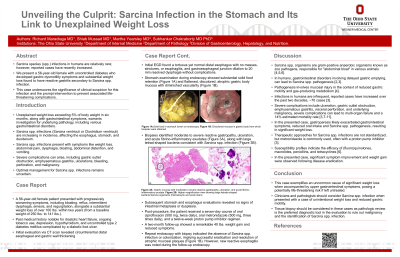Sunday Poster Session
Category: Stomach
P1390 - Unveiling the Culprit: Sarcina Infection in the Stomach and Its Link to Unexplained Weight Loss
Sunday, October 22, 2023
3:30 PM - 7:00 PM PT
Location: Exhibit Hall

Has Audio
.jpg)
Richard Maradiaga, MD
Ohio State University Wexner Medical Center
Columbus, OH
Presenting Author(s)
Richard Maradiaga, MD1, Shiab Mussad, MD2, Martha Yearsley, MD3, Subhankar Chakraborty, MD, PhD3
1Ohio State University Wexner Medical Center, Columbus, OH; 2The Ohio State Wexner Medical Center, Columbus, OH; 3The Ohio State University, Columbus, OH
Introduction: Sarcina species infections in humans are infrequent, although there has been an increase in reported cases involving severe complications, including emphysematous gastritis, ulcerations, and visceral perforation. Weight loss is commonly cited as a presenting symptom though the natural progression of this infection remains poorly understood, and there is currently no consensus regarding its optimal management. We document a clinical case illustrating the manifestation of Sarcina spp. infection specifically in the stomach, leading to a notable degree of weight loss.
Case Description/Methods: A 56-year-old female with uncontrolled diabetes presented with bloating, intermittent dysphagia with regurgitation and a >100 lbs of weight loss from baseline weight of 250 to 141lbs over a two-year period. Incidental distal esophageal thickening was seen on imaging and subsequent upper endoscopy showed a tortuous but otherwise normal distal esophagus with no evidence of mass, stricture, or esophagitis. A stomach examination revealed a large presence of food residue concerning for decreased gastric motility and atrophic flattened and discolored mucosa. Tissue pathology showed marked reactive gastropathy associated with Sarcina spp. infection. The patient had improved PO tolerability after a one-week course of ciprofloxacin, metronidazole, and a proton pump inhibitor, with subsequent gain of 40 lbs on 2 month follow up. A repeat endoscopy with biopsy lacked the presence of Sarcina spp. infection or colonization, however new reactive esophagitis was noted.
Discussion: The presence of Sarcina spp. infection in this patient may be attributed to her history of uncontrolled diabetes and possible baseline impairment of gastric motility, which in this instance resulted in the exacerbation of gastrointestinal symptoms. Although weight loss is a non-specific manifestation, when accompanied by deteriorating symptoms of reduced gastrointestinal motility, consideration should be given to the possibility of Sarcina spp. infection. This case serves as an exemplification of an uncommon cause of significant weight loss, which can pose a life-threatening risk if left unattended. Timely identification and management of Sarcina spp. infections is crucial to prevent the potentially life-threatening complications that have been reported in association with this condition.

Disclosures:
Richard Maradiaga, MD1, Shiab Mussad, MD2, Martha Yearsley, MD3, Subhankar Chakraborty, MD, PhD3. P1390 - Unveiling the Culprit: Sarcina Infection in the Stomach and Its Link to Unexplained Weight Loss, ACG 2023 Annual Scientific Meeting Abstracts. Vancouver, BC, Canada: American College of Gastroenterology.
1Ohio State University Wexner Medical Center, Columbus, OH; 2The Ohio State Wexner Medical Center, Columbus, OH; 3The Ohio State University, Columbus, OH
Introduction: Sarcina species infections in humans are infrequent, although there has been an increase in reported cases involving severe complications, including emphysematous gastritis, ulcerations, and visceral perforation. Weight loss is commonly cited as a presenting symptom though the natural progression of this infection remains poorly understood, and there is currently no consensus regarding its optimal management. We document a clinical case illustrating the manifestation of Sarcina spp. infection specifically in the stomach, leading to a notable degree of weight loss.
Case Description/Methods: A 56-year-old female with uncontrolled diabetes presented with bloating, intermittent dysphagia with regurgitation and a >100 lbs of weight loss from baseline weight of 250 to 141lbs over a two-year period. Incidental distal esophageal thickening was seen on imaging and subsequent upper endoscopy showed a tortuous but otherwise normal distal esophagus with no evidence of mass, stricture, or esophagitis. A stomach examination revealed a large presence of food residue concerning for decreased gastric motility and atrophic flattened and discolored mucosa. Tissue pathology showed marked reactive gastropathy associated with Sarcina spp. infection. The patient had improved PO tolerability after a one-week course of ciprofloxacin, metronidazole, and a proton pump inhibitor, with subsequent gain of 40 lbs on 2 month follow up. A repeat endoscopy with biopsy lacked the presence of Sarcina spp. infection or colonization, however new reactive esophagitis was noted.
Discussion: The presence of Sarcina spp. infection in this patient may be attributed to her history of uncontrolled diabetes and possible baseline impairment of gastric motility, which in this instance resulted in the exacerbation of gastrointestinal symptoms. Although weight loss is a non-specific manifestation, when accompanied by deteriorating symptoms of reduced gastrointestinal motility, consideration should be given to the possibility of Sarcina spp. infection. This case serves as an exemplification of an uncommon cause of significant weight loss, which can pose a life-threatening risk if left unattended. Timely identification and management of Sarcina spp. infections is crucial to prevent the potentially life-threatening complications that have been reported in association with this condition.

Figure: Figure 1 A Gastric mucosa with moderate to severe reactive gastropathy, ulceration, and acute fibrino-inflammatory exudate with embedded small tetrad organisms. B large tetrads shaped bacteria Sarcina organisms. (hematoxylin and eosin; original magnification). Esophagogastroduodenoscopy C gastric antrum erythema with pale atrophic mucosal patches.
Disclosures:
Richard Maradiaga indicated no relevant financial relationships.
Shiab Mussad indicated no relevant financial relationships.
Martha Yearsley indicated no relevant financial relationships.
Subhankar Chakraborty: Coloplast – Consultant. Medtronic – Consultant.
Richard Maradiaga, MD1, Shiab Mussad, MD2, Martha Yearsley, MD3, Subhankar Chakraborty, MD, PhD3. P1390 - Unveiling the Culprit: Sarcina Infection in the Stomach and Its Link to Unexplained Weight Loss, ACG 2023 Annual Scientific Meeting Abstracts. Vancouver, BC, Canada: American College of Gastroenterology.
